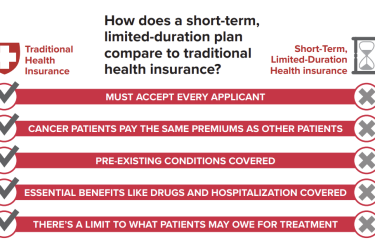
A variety of fixes aimed at appeasing resistant conservative House members failed to save the GOP’s Affordable Care Act repeal bill, which was pulled from consideration late Friday.
Among last-minute changes to the GOP’s proposed American Health Care Act (ACHA) was language that would have repealed 10 so-called “essential health benefits” in the individual market, letting states decided which mandates they wanted. States would have had to decide what they wanted in time for plan year 2018 – a timetable considered pretty ambitious since insurers have to make their plans for the coming year later this spring.
Republicans, who for years have wanted to kill the ACA, had been looking at variety of ways to bring down the cost of insurance and give people more choice with less federal regulation. Supporters of the new language thought that the quickest way to bring down premium costs would be to reduce mandated benefits. But critics argued that removal of EHBs would have eroded comprehensive coverage and make it harder for consumers to understand precisely what benefits they were receiving. There also were fears that the changes would water down protection for people with pre-existing conditions and accelerate any “death spiral” in the insurance market that Republican have been warning about.
Another problem with the approach: other popular protections – such as a ban on annual and lifetime limits – are tied to the EHBs, as this blog post from the Center for Budget and Policy Priorities explains.
Even if these amendments to the bill had brought enough conservative lawmakers on board to pass the bill (without losing more moderate votes), the AHCA was considered unlikely to survive the Senate.
The benefits required under the Affordable Care Act – many of which were unavailable or limited in the pre-ACA individual market are:
- Ambulatory patient services (outpatient)
- Emergency care
- Hospitalization
- Maternity and newborn care
- Mental health and substance use disorder services
- Prescription drugs
- Rehabilitative and habilitative services and devices
- Laboratory services
- Preventive and wellness services, including management of chronic disease
- Pediatric services, including oral and vision care. (Adult dental and vision are not mandatory)
Here are links to some pieces that explain it well:
- Julia Belluz at Vox: The fight over “essential health benefits” explained
- Ron Brownstein at the Atlantic: The Trouble With Killing Obamacare’s ‘Essential Health Benefits’
- Tim Jost at the Health Affairs Blog raises some more technical legal and regulatory questions about state decision-making and federal tax credits.
- Conservative health policy expert Lanhee Chen defends the end of federal EHBs in a Fox news opinion essay.
Editor’s note: After this was posted, GOP leadership late Friday decided to pull the American Health Care Act from consideration due to lack of support in the House of Representatives. The blog has been updated to reflect this.








